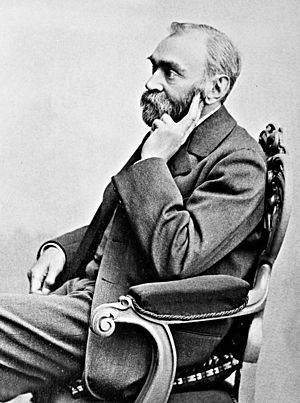List of Nobel laureates in Chemistry facts for kids
The Nobel Prize in Chemistry is a super important award given every year to scientists who make amazing discoveries in chemistry. It's one of five special prizes created by a Swedish inventor named Alfred Nobel way back in 1895. He wanted to celebrate people who made the world a better place through their work.
These Nobel Prizes honor great achievements in chemistry, physics, literature, peace, and medicine. The Nobel Foundation manages the prizes, and the Royal Swedish Academy of Sciences chooses the chemistry winners.
The very first Nobel Prize in Chemistry was given in 1901 to Jacobus Henricus van 't Hoff from the Netherlands. Each winner gets a shiny medal, a special diploma, and a money prize. The awards ceremony happens every year in Stockholm on December 10th, which is the day Alfred Nobel passed away.
Contents
Cool Facts About the Chemistry Prize
- Many Discoveries: A lot of Nobel Prizes in Chemistry, at least 25, have been given for work in organic chemistry. This is a branch of chemistry that studies carbon-based compounds, which are super important for life!
- Unusual Situations: Sometimes, things get complicated. For example, two German scientists, Richard Kuhn (in 1938) and Adolf Butenandt (in 1939), were not allowed by their government to accept their prizes. They eventually received their medal and diploma, but not the money.
- Double Winners: Imagine winning a Nobel Prize once! Some amazing scientists have won it twice!
- Frederick Sanger won the Chemistry Prize two times (in 1958 and 1980) for his work on proteins and DNA.
- Karl Barry Sharpless also won the Chemistry Prize twice (in 2001 and 2022).
- Maria Skłodowska-Curie won a Nobel Prize in Physics in 1903 and then another in Chemistry in 1911. She was the first woman to win a Nobel Prize and the only person to win in two different sciences!
- Linus Pauling won the Chemistry Prize in 1954 and the Peace Prize in 1962.
- Women in Chemistry: As of 2023, eight incredible women have won the Nobel Prize in Chemistry. Maria Skłodowska-Curie was the very first, winning in 1911.
When the Prize Wasn't Awarded
Sometimes, the Nobel Prize in Chemistry wasn't given out. This happened for eight years, like during World War I and World War II (1916, 1917, 1919, 1924, 1933, and from 1940 to 1942). Other times, the announcement was just delayed by a year. For example, the 1914 prize was given in 1915 to Theodore William Richards because the committee felt no one met the high standards that year.
A Look at Some Chemistry Laureates
Here are some of the brilliant scientists who have won the Nobel Prize in Chemistry and what they were recognized for. Many more amazing scientists have received this honor!
| Year | Image | Laureate | Nationality | What they discovered |
|---|---|---|---|---|
| 1901 |  |
Jacobus Henricus van 't Hoff (1852–1911) |
For understanding how chemicals react and how liquids move through membranes. | |
| 1902 |  |
Hermann Emil Fischer (1852–1919) |
For making important discoveries about sugars and other vital molecules. | |
| 1903 |  |
Svante August Arrhenius (1859–1927) |
For his ideas on how acids and salts break apart in water. | |
| 1904 |  |
Sir William Ramsay (1852–1916) |
For finding new gases in the air, like neon and argon, and figuring out where they fit on the periodic table. | |
| 1905 |  |
Adolf von Baeyer (1835–1917) |
For his work on organic dyes, like indigo, which helped the chemical industry. | |
| 1911 |  |
Marie Curie, née Skłodowska (1867–1934) |
For discovering the elements radium and polonium, and studying their amazing properties. | |
| 2023 |  |
Moungi G. Bawendi (b. 1961) |
For discovering and creating tiny, glowing particles called quantum dots, used in screens and medicine. | |
 |
Louis E. Brus (b. 1943) |
|||
 |
Alexey Ekimov (b. 1945) |
|||
| 2024 |  |
David Baker (b. 1962) |
For using computers to design new proteins and predict their shapes, which is key for new medicines. | |
 |
Demis Hassabis (b. 1976) |
For using computers to design new proteins and predict their shapes, which is key for new medicines. | ||
 |
John M. Jumper (b. 1985) |
|||
| 2025 |  |
Susumu Kitagawa (b. 1951) |
For creating special materials called metal–organic frameworks (MOFs) that can store gases or clean water. | |
| Richard Robson (b. 1937) |
||||
 |
Omar M. Yaghi (b. 1965) |
See also
 In Spanish: Anexo:Ganadores del Premio Nobel de Química para niños
In Spanish: Anexo:Ganadores del Premio Nobel de Química para niños
- Timeline of chemistry
 | John T. Biggers |
 | Thomas Blackshear |
 | Mark Bradford |
 | Beverly Buchanan |


